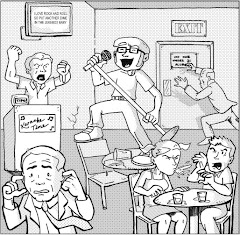Zot! #29, December 1989, Eclipse Comics
writer & artist: Scott McCloud
plot assistance: Ivy Ratafia
editor: Catherine Yronwode
Most fanboys know Scott McCloud from his insightful analyses of the comics medium in the books Understanding Comics, Reinventing Comics, and the soon to be released Making Comics. I had the pleasure of seeing him in action at the Comic Con during a workshop premiering and promoting ideas from the new book. I knew that he had created a comic called Zot!, but like many others, I'm sure, I had never read an issue . . . until today. Not to my surprise, I enjoyed it quite a bit.
First of all, I'm sure McCloud himself will admit that he is not the best artist, but his distinctive style has a tenacity that pulls the reader past its faults and deep into its strengths: his characters' consistency, his skill with shading and crosshatching, his attention to background detail. Even in this issue, which was published four years before Understanding Comics, McCloud demonstrates some of the visual principles he has explored in his texts since. He paces his panels very carefully, with strategic interplay between the characters and critical plot advancements. Considering this issue with what was to come in McCloud's future, it was interesting to see through the analytical empire at a small part of its the carefully laid foundation.
McCloud's scholarly approach to the medium is evident in his exploration of the superhero in society, as well. Zot is a hero from a parallel utopian Earth that has traveled to this dimension to fight evil. Although this issue begins with a romantic subplot that exudes awkwardness effectively for both its participants and the readers alike, the bulk of this story features Zot looking for crime. He literally lands in the middle of a busy New York intersection and loudly asks, "Anyone know where I can find some crime?" Initially ignored by the midday business crowd, Zot coerces some pedestrians to point him in the right direction, and all of the well groomed office types suggest the various neighborhoods housing a more, um, ethnically diverse population: Harlem, South Bronx, Hell's Kitchen, the lower east side. When Zot hits Harlem, he notices the difference immediately, and much of the ensuing narrative flirts with the racial angle: "Try Wall Street, man! Yeah! Or the White House! That’s real crime!" Interesting.
Zot demonstrates flight and invisibility, but he isn't very super. He requests the assistance of an unwilling pedestrian to help him carry an ailing homeless man to the hospital. In the end, Zot saves them both, the hobo from death, the stuffed shirt from apathy. No strength, no real fighting skill, Zot's most endearing qualities are his idealism and naiveté. Throughout his venture in the city, Zot sulks at his inability to find crime, then when granted an opportunity or two to help someone, he laments his inability to do more. In the end, thinking about the city's racial divide, he wonders if our history differs from his America's past. McCloud closes with a thoughtful presumption from Zot: "Maybe the south won." Again, interesting.
In the letter column, readers offer feedback from a previous issue's handling of homosexuality, and one reader in particular seems disappointed and angered in the story's failure to address the topic holistically. A similar argument can be made for this issue's racially charged plot. I agree with McCloud's response and believe it represents the comics field, not to mention art in itself, as a whole: "If I have just one small observation to make about a social issue, I should be allowed to do so, without being expected to provide a whole encyclopedia of political dogma to back it up." Comics have been dabbling in this issue quite frequently lately, with Batwoman's public outing last month and the silly tabloid debate about the Man of Steel's orientation in Superman Returns. (The former strikes me as a deliberate publicity strategy that might warrant some criticism, more of a corporate ploy than an expression of orientation.) To elaborate on McCloud's retort, despite any artists' efforts to address a hot button topic, the subject is always conveyed through the respective artist's perspective, complete with his presuppositions and subconscious inclinations. Consider this story: by exploring the reality of a potential superhero's mission, McCloud conveys the loneliness and ultimate impossibility of such a cause . . . a rather pessimistic opinion for a genre that hinges on its happy endings. The very nature of art allows its creators the opportunity to express and elicit such emotion. This letter writer may have had an adverse reaction, but because it was heartfelt, McCloud did his job successfully. If only comics took themselves that seriously.
Considering this complete context, Scott McCloud has obviously always played a critical role in the comics world inspiring discussion with his work. Although many of his contemporary fans may not understand the breadth of his experience in the field, McCloud has never had to reinvent his image as an artist. He's remained consistent in his sophistication and skill, albeit improving along the way, successfully making a name for himself as an influential voice for our generation. I was grateful for his contributions before. Now with a Zot! in my hands, I have plenty more to think about.
Saturday, August 12, 2006
Subscribe to:
Post Comments (Atom)



No comments:
Post a Comment